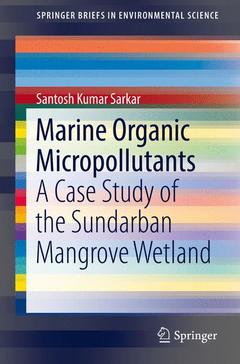Marine Organic Micropollutants, 1st ed. 2016 A Case Study of the Sundarban Mangrove Wetland SpringerBriefs in Environmental Science Series
Auteur : Sarkar Santosh Kumar

Introduction.- Characteristics features of the organic micropollutants.- Micropollutants in marine sediments.- Level of organochlorine pesticides (DDTs and HCHs) in sediments.- Factors affecting proper application of Pesticides.- Level of PCBs in sediments.- Level of PAHs in sediments.- PAHs in core sediments in Sundarban mangrove wetland : A case study.- Accumulation of micropollutants in marine biota.- Ecotoxicological Concerns.- Conclusion and Recommendations.
Date de parution : 09-2016
Ouvrage de 89 p.
15.5x23.5 cm



